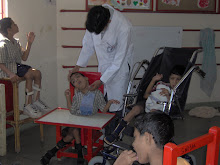Almost 8 years ago I got my first exposure to special needs individuals by working as a volunteer. This was made possible by an institution called Vidyasagar in Chennai. I did not practice dentistry on my first visit, the visit was mainly fun, and yet in many ways the visit changed my life. It guided me towards pediatric dentistry (and the eventual step into special needs dentistry). In Delhi recently, I met the former Director of vidyasagar, Mrs Poonam Natrajan, a dynamic lady whose "welcome aboard" attitude was the key to making sure that Vidyasagar was never short of volunteers. She is currently the Chairperson of the National Trust for persons with Autism, Cerebral Palsy, Mental Retardation and Multiple disabilities. When I mentioned to her how much my time at vidyasagar had helped me, she pointed out that there were really few doctors who wanted to take time off; and worse still fewer NGO's that were willing to take them on. The problem she assured me was not one of lack of willingness. Many NGO's did not know what to do with doctors or dentists who volunteered.
As someone who benefited immensely from my experience as a volunteer I felt that DCSN ought to offer a few tips to the dental student considering to volunteer. Below we try to answer a few of the commonly asked (or unasked) questions that bother each student who wishes to be a prospective volunteer.
Why Should I do it?
Apart from the obvious moral benefits of volunteering to work with individuals with special care needs, there is a more palpable benefit. A large part of special needs dentistry lies in overcoming a fear of working with such individuals. Volunteering (even if it involves no medical or dental experience), gives every young dentist a confidence in interacting with individuals with special needs. Furthermore as a volunteer you are not bound by the strict objectivity or lack of interaction that a medical opinion demands (and which you will develop in later practice). As a young student volunteer you make friends who will stay with you for a life time.
When Should I do it?
Volunteering can be done at any age. The idea of spending time with individuals with special needs requires no special training. Many institutions (who have established programs) will give you a job that is in keeping with your level of training or comfort. (My first job of supervising sports clearly needed no skill!!!)
The only problem is that not all institutions are clear about what a volunteer is supposed to do. If you are unclear about your role and the organization feels you are dead weight then the situation may quickly deteriorate into boredom for you and frustration for your hosts.
Where the path is not defined make your own road...
Institutions may not realize the potential of having a dentist volunteer to work with them, however in most cases, given that you will be unpaid, they are more than welcome to have you on board. A little research into public health programs or brushing techniques; combined with a non invasive examination and counselling of parents is easily achievable. Organizations quickly recognize the potential of developing your experience into an organized camp. Furthermore you can serve as a bridge between your institution and the institution where you are volunteering... once you put your mind to it the possibilities are endless.
How long should I do it?
This depends on what you would like to do. If you would like to be a full time volunteer (working the whole day at the school) then a month is the ideal duration. You need at least a month to get a feel of the challenges that you will face as a special care dentist (trust me adaptation is more difficult for you than the patient!). A longer stay is only warranted if you know what it is that your role in the organization is. If you are able to let the institution allow you to be a teaching assistant then you may want to stay on longer. Some institutions in urban areas may offer you the option of working an evening course or teaching on weekends; in which case you should stay for at least a semester.
Will the Organization let me In ? Will I be Charged?
For any institution that deals with special care individuals the safety of the individuals (whether residents or day scholars) is paramount. If your College is known to them then many places will let you in on the basis of a letter from your college certifying that you are a bona-fide student. Most of the better organizations will charge only for your board and lodge, some may impose a small administrative fee but remember that if the institution is quoting a high fee to let you into a volunteer program, the institution may not be worth it at all.
Lastly it must be emphasized that being a volunteer doesn't make you an expert. If you are unsure then you can always say so. You can learn loads from people who have been Special Educators for a long time. Volunteering may just cost you one part of a summer vacation; but the memories will stay with you for a lifetime. Even if you do not make Special Needs dentistry your chosen vocation, the people you meet, their determination to overcome the odds and the general camaraderie of a good volunteer program are things that no one should miss out on.
For Opportunities on Working with NGOs in India you can contact the National Trust at
National Trust
For the Welfare of persons with Autism, Cerebral Palsy, Mental Retardation and Multiple disabilities.
(Ministry of Social Justice and Empowerment, Govt of India)
16-B Bada Bazaar Road
Old Rajinder Nagar
New Delhi 110060
Email : contactus@thenationaltrust.in








